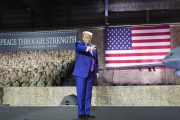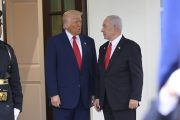
Despite all the ballyhoo and bluster of Donald Trump’s 2016 presidential campaign, with all of his strong rhetoric against NAFTA and other trade deals, his new deal with Canada and Mexico (USMCA) not only promises more of the same, but even promises more restrictions on private business than before.
Trump’s criticisms of NAFTA were a large part of his 2016 campaign, along with his promises that he would either make the trade deal with Mexico and Canada more in the interests of American workers and businesses — or he would scrap it. Early indications are that Trump has done neither, but has instead negotiated a trade deal that places even more regulations on American business, and further diminishes the national sovereignty of the United States.
First of all, the deal is 1800 pages long. For those who argue that they are just for “free trade,” one has to wonder why it takes 1,800 pages to accomplish that. After all, if a business person in Mexico wants to sell something to a business person in Canada or the United States, does it really take 1800 pages of text to make that happen?
President Trump received accolades from many American conservatives when he appeared to stand up to the very liberal prime minister of Canada, Justin Trudeau, but the stark reality is that Trudeau came out very well with the final product in the new deal. Trudeau wanted his very progressive social politics written into USMCA, and it looks like he got it.
The deal includes provisions that the governments of the United States, Mexico, and Canada will craft laws to offer “protection” to workers on the basis of sex, including sexual orientation and gender identity. In other words, business owners, if USMCA is approved, and Congress follows through with this provision, will have to contend with threats of lawsuits from employees charging discrimination against them due to some deluded guy thinking he is a woman, or some woman thinking she is a man.
Most Americans couldn’t care less whether another American male thinks he is a woman, just so long as the guy doesn’t infringe on their rights. After all, some guy in a mental institution thinking he is Jesus Christ doesn’t usually affect anyone else’s rights — unless we are forced to treat them as the Second Person of the Trinity. But what Americans can expect with this Trump-negotiated deal is men claiming to be women wanting to be treated as a woman. That would include, of course, the “right” to use the women’s restrooms and showers at work, but it would not be limited to that.
What it would include is only limited by the latest liberal cause, which is uncertain, because who can guess at what some liberal might imagine as a “right” in the future?
So, just because President Trump and Vice President Mike Pence cast themselves as defenders of certain values against encroachment by LGBTQ activists, the text of this agreement screams otherwise.
Assurances by a U.S. trade spokesperson that “the draft provision would require no changes to U.S. law” should be taken with a great amount of skepticism.
Of course, the USMCA means nothing unless it is agreed to by Congress. And, because of just how extensive the agreement is, it is difficult to imagine how it would not be considered a treaty. According to the Constitution of the United States, any agreement negotiated by the president requires a two-thirds vote of the United States Senate.
Senator Chuck Grassley (R-Iowa) first suggested that the deal could be ratified during the “lame-duck” session between the midterm elections on November 6 and the swearing in of the new Congress in January. But Senate Majority Leader Mitch McConnell (R-Ky.) recently rejected that idea. Senator Rob Portman (R-Ohio), formerly a U.S. trade representative, offered a similar view.
“It won’t be voted on by Congress until next year because of the amount of time it takes under our Trade Promotion Authority in Congress. I should say there is one small caveat, which is you could, if Congress agreed, you could expedite that process a little bit and try to do something before the year end.”
While Portman conceded that such a scenario was “possible,” he said it would be very difficult, and concluded that it is “more likely” that it will come up next year.
Let us hope so. Despite the clear wording of the Constitution that treaties require a two-thirds vote of the Senate, we can expect there will be an effort to circumvent that requirement by saying that USMCA is really not a treaty, but rather just an agreement.
It might look like a duck, and walk like a duck, and quack like a duck, but expect the supporters of this deal to argue that it is really a giraffe.
Even more serious than the issue of whether the deal will force business owners to contend with some employee who is unsure whether he is a man or a woman, is the larger issue of who should make the laws for the American economy — the Congress or the state legislatures, or some trade deal negotiated by trade bureaucrats?





